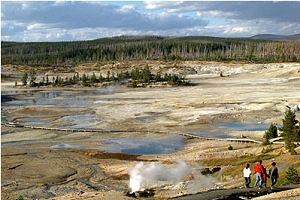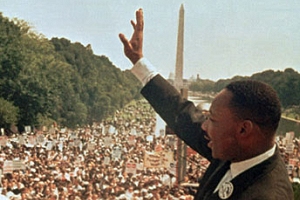America in context
Sharing Our National Park System With the World

The United States launched a conservation ethic with establishment of Yellowstone National Park in 1872 and today manages some 34 million hectares in parks and 36.4 million hectares in wildlife refuges. The country is committed to helping other countries share in the conservation and economic benefits of land and wildlife preservation.
Examples include its participation in the Congo Basin Forest Partnership to protect lands and combat illegal logging in West Central Africa and a debt-for-nature swap with the Republic of Panama that allows the Central American nation to reduce a portion of its debt to the United States in exchange for generating funds to protect its biologically rich tropical forests
More than 270 million people visited the United States national parks last year, inspired by their beauty and wildness. Our countrys park system, once described as Americas "best idea," includes 388 parks and encompasses some 34 million hectares, an area roughly the size of Germany. In addition, the United States has established 545 national wildlife refuges, protecting more than 36.4 million hectares to benefit wildlife, fisheries, and biodiversity. The government manages another 186 million hectares of protected land, including national forests, wilderness areas, and marine sanctuaries.
Americans treasure wild public lands because they offer opportunities for solace and recreation and a chance to reconnect with the outdoors, learn about our nations history, and recharge our batteries. They provide critical habitat for wildlife, a vital ecological and economic resource that also embraces important scientific, cultural, aesthetic, and spiritual values. Moreover, public lands serve as engines of economic development by attracting tourists and, in some instances, providing a source of revenue for schools, transportation, and other needs.
We take pride in the fact that our nation is home to Yellowstone National Park, the worlds first national park. The establishment of this park in 1872 launched a conservation ethic in the United States and prompted the preservation of wild places and wild resources for their own intrinsic values and for the benefit of future generations. Individual states, conservation groups, local communities, and private landowners have protected vast areas of open space, watersheds, and wildlife habitat.
We are sharing with other nations the experiences we have gained in developing a network of protected lands. This is an important task because increasing competition for natural resources, growing scarcity of these resources, changes in land use patterns, economic development, political stability, and climate change can have enormous effects on the well-being of our lands.
People around the world are tackling these problems, seeking to build an enduring conservation movement that reaches to the corners of the globe. There are now more than 102,000 protected areas in the world, covering more than 10 percent of Earths land surface. They encompass ecologically and economically important ecosystems, from mountain ridges to coral reefs, and total 18.8 million square kilometers—an area twice the size of Europe. The number of these areas continues to expand.
In recent years, developing countries have led the way in setting aside national parks and protected reserves. In doing so, they demonstrate a commitment to conservation that exemplifies great courage and boldness.
America has been proud to lend a hand to other nations interested in establishing systems of protected areas. For example, we are doing so through the Congo Basin Forest Partnership, an initiative that unites more than 30 governments, international organizations, businesses, and environmental groups. The partnership aims to establish national networks of protected areas across West Central Africa in order to safeguard one of the worlds two largest intact tropical forests. At the same time, the Congo Partnership offers local people a stake in the forest by promoting sustainable harvesting and providing livelihoods such as ecotourism.
The six Congo Basin countries that have courageously bet their future well-being on the benefits of forest conservation are driving forces in this partnership. These nations see a future based on respecting, not exploiting, nature.
The United States is contributing $53 million over four years to create the training programs, infrastructure, and management and enforcement regimes necessary to realize this vision of a system of protected areas and sustainable forest management. In total, this undertaking could develop as many as 27 national parks and protect more than 10 million hectares.
The Congo Basin Forest Partnership is also a powerful mechanism for stemming the take of bushmeat and advancing the fight against illegal logging. Illegal logging destroys ecosystems and threatens protected areas worldwide, and it costs governments $10 to $15 billion annually in lost revenues, according to estimates by the World Bank.
That is why President Bush launched the Initiative Against Illegal Logging to help developing countries reduce threats to protected areas. Through the initiative, we are working with other governments and nongovernmental organizations (NGOs) to improve forest law enforcement in Africa, protect orangutan habitat in Indonesia, and monitor forests in Brazil with remote sensing, among many other actions.
The United States is also promoting protected areas abroad through debt-for-nature swaps. These innovative agreements allow eligible developing nations to reduce their debt to the United States while generating funds to protect their tropical forests. Since 2000, we have concluded nine agreements that will generate $95 million to conserve forests in eight countries over the next two decades. Three U.S.-based international NGOs have contributed $7.5 million, in addition to debt relief funding appropriated by Congress, to make these agreements possible. 1
Recently, the United States concluded an agreement with the Republic of Panama that, with the help of a contribution of $1.3 million from The Nature Conservancy, an international NGO, will generate $10 million to protect and conserve Panamas 129,000-hectare Chagres National Park over the next 12 years. The Chagres National Park provides 50 percent of the water necessary to operate the Panama Canal, supplies the drinking water for that countrys two largest cities, and serves as a habitat for endangered species such as jaguars, mantled howler monkeys, and the harpy eagle.
Another agreement with Panama will conserve the exceptionally biologically rich forests of the Darien National Park, which contains a unique biological bridge where North and South America meet and shelters a diverse range of flora and fauna.
In both cases, the funds resulting from these agreements will support specific conservation activities in the national parks and create permanent endowments to provide sustainable funding to the parks.
Americans are proud to share our heritage of land conservation with nations seeking to establish protected areas. By helping citizens around the world manage their natural resources on a sustainable basis, we are fostering a more hopeful world for millions of our fellow human beings and preserving great wild places for the enjoyment of future generations.
(1) Nations currently participating in the debt-for-nature swap are Bangladesh, Belize, Colombia, El Salvador, Jamaica, Panama, the Philippines, and Peru. Participating NGOs are The Nature Conservancy, Conservation International, and the World Wildlife Fund.
About the Author:
John F. Turner is Assistant Secretary of State for Oceans and International Environmental and Scientific Affairs. Prior to joining the State Department, Turner served as president and chief executive officer of The Conservation Fund, a national nonprofit organization dedicated to public-private partnerships to protect land and water resources.
Additional Readings:
Protecting the Environment: 30 Years of U.S. Progress. An Electronic Journal of the U.S. Department of State, June 2005
Recently on America in context
Religion in America
 One of the bedrock principles of the United States is religious liberty and the separation of church and state. At the time the Republic was founded more than two centuries ago, the overwhelming majority of Americans were Christians. Since that time, however, the United States has become the worlds most religiously diverse society, especially during the last three decades.
One of the bedrock principles of the United States is religious liberty and the separation of church and state. At the time the Republic was founded more than two centuries ago, the overwhelming majority of Americans were Christians. Since that time, however, the United States has become the worlds most religiously diverse society, especially during the last three decades.
Protecting Minority Rights
 "I have a dream that my four little children will one day live in a nation where they will not be judged by the color of their skin but by the content of their character."
"I have a dream that my four little children will one day live in a nation where they will not be judged by the color of their skin but by the content of their character."
-- Dr. Martin Luther King, Jr.
March on Washington Speech, August, 1963
Freedom's Watchdog: The Press in the U.S.
 "It is well to remember that freedom through the press is the thing that comes first," Murrow told the New York Herald Tribune in 1958, stressing his own belief in a great democratic institution. "Most of us probably feel we couldn't be free without newspapers, and that is the real reason we want the newspapers to be free."
"It is well to remember that freedom through the press is the thing that comes first," Murrow told the New York Herald Tribune in 1958, stressing his own belief in a great democratic institution. "Most of us probably feel we couldn't be free without newspapers, and that is the real reason we want the newspapers to be free."